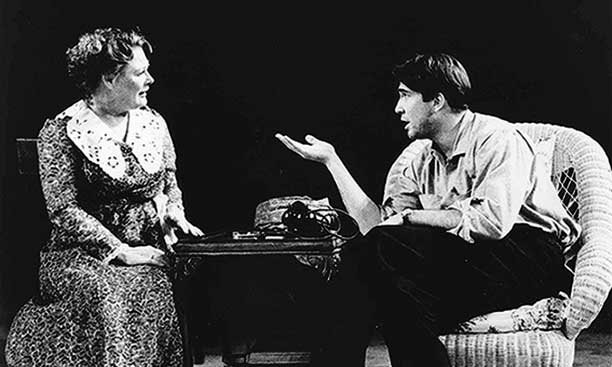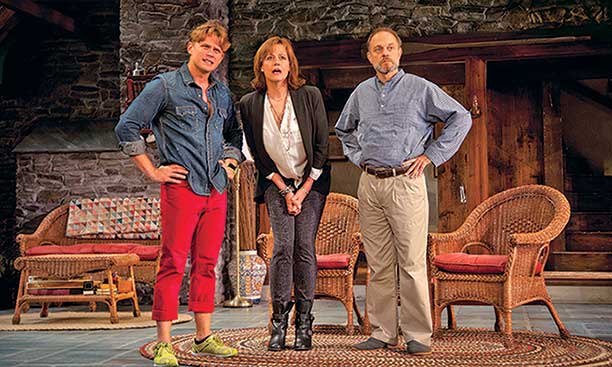Q&A: Emily Mann, a Champion of New Work, New Voices on the Stage
She also spearheaded the construction of the 360-seat Berlind Theatre in 2003 — financed jointly with the University — which enhanced McCarter by serving as a platform for student performances, University events, and McCarter productions suited to a smaller stage. McCarter — an independent nonprofit housed on Princeton’s campus — has a long history of collaborating and sharing resources with the University.
In addition to leading McCarter, Mann is a director and playwright who has won eight Obie awards, which recognize off-Broadway theater. Following the announcement that she will step down from her positions at McCarter in 2020, Mann talked with PAW about her legacy, her collaborations with Princeton, and sexism in the theater.
You are the first woman to lead McCarter. There were many people along the way who discouraged you from pursuing a life in theater, especially your adviser at Harvard, where you were an undergraduate.
My adviser said to me, “You’re quite talented, but you know women can’t direct or write plays professionally in the American theater. Why don’t you think about going into children’s theater?” The top of my head nearly blew off with anger, but I held onto it and said to myself, “Oh no, I am going to do this, and if I have to be first to do it, I will be first to do it.”
In the face of sexism, you just kept going?
If I had let myself get eaten up by anger, I wasn’t going to learn anything. At theaters all over the country, I was the first woman to direct. We have come a long way, but the percentage of women directors is still nowhere near parity. It’s still not an equal playing field.
You were drawn to McCarter in part because of its close relationship with Princeton. What has been your most important collaboration with the University?
The perfect example is the Princeton and Slavery Project [a 2017 project exploring the University’s ties to slavery]. Professor Martha Sandweiss came to me, knowing about the work I’ve done on African American history. We decided to commission seven playwrights to be inspired by the archives and write 10-minute plays, which were part of the weekend symposium on Princeton and slavery.
I loved being able to engage with students, with faculty, and to feel that incredible energy that can happen between an arts institution and a university. It is a wonderful cross-pollination.
You have spoken publicly about being diagnosed with multiple sclerosis in 1994. How has that affected your career?
I’ve been in remission for 15 years, so I’m one of the very fortunate ones. For six or seven years — before we found which drugs worked in the right combination — I was in and out of a wheelchair. But I never missed a rehearsal. I never missed a day of work.
I was diagnosed right before the Tonys [in 1994]. At that time, when you won best regional theater, the artistic director went out alone to receive it. I was not having a good day and couldn’t walk, so Jeff Woodward and Liz Fillo said, “We will go out with you. We will hold you on either side, your board president and managing director, and support you as you walk.” Nobody knew. I didn’t even tell my mother. We carried it off. And we started a new tradition! Every year since then, the artistic director comes out with her board president and managing director.
What do you see as your legacy?
So much of my work has been by and about and for women and people of color, though I didn’t state it for the longest time, I just did it. We’ve been leading the conversation on that all along. We have birthed into the world and into the canon some of the more important plays by and about women and people of color.
What makes theater so magical for you?
It’s live. A live performance is a conversation between the audience and what’s on stage, and between audience members and each other. We’ve needed that since the beginning of time, when we sat around campfires and told each other stories. I have seen people transformed by seeing theater and creating theater. It is one of the great privileges to do it every day.
Interview conducted and condensed by Jennifer Altmann
Highlights of Mann’s Tenure At McCarter
1991: Tennessee Williams’ The Glass Menagerie, the first McCarter production directed by Emily Mann, opens Jan. 15. The cast features Shirley Knight, Judy Kuhn, and a young Dylan McDermott.
1994: McCarter receives the Regional Theatre Tony Award.
1995: Having Our Say, written and directed by Mann and developed at McCarter, moves to Broadway and tours nationally.
2001: Mann launches the Sallie B. Goodman Artists’ Retreat. It continues to be a centerpiece of the McCarter LAB, a creative incubator for artists.
2003: A joint project of McCarter and the University, the Berlind Theatre opens with Nilo Cruz’s Pulitzer Prize-winning Anna in the Tropics. Directed by Mann and featuring Jimmy Smits and Daphne Rubin-Vega, it then moves to Broadway.
2013: Christopher Durang’s Vanya and Sonia and Masha and Spike, commissioned by McCarter, moves to Broadway after its McCarter premiere and wins the Tony Award for Best Play.














No responses yet